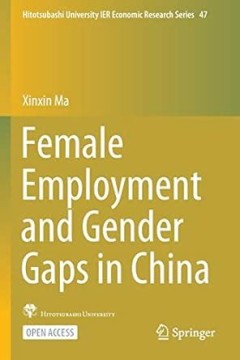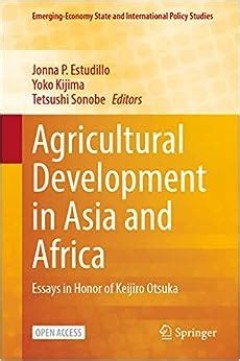Filter by

Loneliness in Europe: Determinants, Risks and Interventions
This open-access volume accompanies the microdata release of the EU Loneliness Survey. Loneliness, often referred to as the ‘epidemic of the 21st century’, has emerged as a grave public health concern. For years, a lack of comprehensive European cross-national data hindered a thorough examination of this issue. In 2022, the European Commission's Joint Research Centre conducted the inaugu…
- Edition
- -
- ISBN/ISSN
- 9783031665820
- Collation
- XVIII, 176
- Series Title
- -
- Call Number
- -

Advancing Energy Policy : Lessons on the integration of Social Sciences and H…
This open access book advocates for the Social Sciences and Humanities to be more involved in energy policymaking. It forms part of the European platform for energy-related Social Sciences and Humanities’ activities, and works on the premise that crossing disciplines is essential. All of its contributions are highly interdisciplinary, with each chapter grounded in at least three different Soc…
- Edition
- 1
- ISBN/ISSN
- 9783319990972
- Collation
- XXVII, 193 hlm; ill., lamp.,
- Series Title
- -
- Call Number
- -

Megatrends in Agriculture, Food Industry and Food Markets : An Empirical and …
This book offers a research-based, holistic overview of the entire value chain of the global food industry. It captures and defines over 80 contemporary ‘megatrends’ in agriculture and the food market that can be empirically documented and have a major impact on business, economies, industries, societies, and individuals. Today the world is characterized by more uncertainty and unpredict…
- Edition
- 1
- ISBN/ISSN
- 9783031581526
- Collation
- XLV, 410 hlm; ill., lamp.,
- Series Title
- -
- Call Number
- -

Precision Oncology and Cancer Biomarkers: Issues at Stake and Matters of Concern
This open access book reflects on matters of social and ethical concern raised in the daily practices of those working in and around precision oncology. Each chapter addresses the experiences, concerns and issues at stake for people who work in settings where precision oncology is practiced, enacted, imagined or discussed. It subsequently discusses and analyses bioethical dilemmas, scientific c…
- Edition
- 1
- ISBN/ISSN
- -
- Collation
- -
- Series Title
- Human Perspectives in Health Sciences and Technology
- Call Number
- XIV, 281

Internal Migration, Urbanization and Poverty in Asia: Dynamics and Interrelat…
This book is Open Access under a CC BY license. This volume offers an essential resource for economic policymakers as well as students of development economics focusing on the interrelationships of migration, urbanization and poverty in Asia. The continent’s recent demographic transitions and rural-urban structural transformations are extraordinary, and involve complexities that require …
- Edition
- 1
- ISBN/ISSN
- 9789811315374
- Collation
- XII, 367 hlm,: ill, lamp;
- Series Title
- -
- Call Number
- -

Female Employment and Gender Gaps in China
This open access book investigates female employment and the gender gap in the labor market and households during China’s economic transition period. It provides the reader with academic evidence for understanding the mechanism of female labor force participation, the determinants of the gender gap in the labor market, and the impact of policy transformation on women’s wages and employment …
- Edition
- 1
- ISBN/ISSN
- 978-981-33-6904-7
- Collation
- -
- Series Title
- -
- Call Number
- -

“Ye Shall Know Them by Their Fruits”: A Mixed Methods Study on Corruption…
Why are historically Catholic countries and regions generally more corrupt and less competitive than historically Protestant ones? How has institutionalization of religion influenced the prosperity of countries in Europe and the Americas? This open access book addresses these critical questions by elucidating the hegemonic and emancipatory religious factors leading to these dissimilarities bet…
- Edition
- 1
- ISBN/ISSN
- 9783030784980
- Collation
- XXXVI, 407
- Series Title
- -
- Call Number
- -

Agricultural Development in Asia and Africa: Essays in Honor of Keijiro Otsuka
This Open Access book explores the multifaceted nature of agricultural and rural development in Asia and examines the extent to which the Asian experience is being replicated in contemporary Africa. This volume compiles the works of top scholars who provided analyses and evidences from household-level surveys collected for many years in several parts of Asia and Africa. The most important findi…
- Edition
- 1
- ISBN/ISSN
- 9789811955426
- Collation
- XXXIII, 387hlm,: ill, lamp;
- Series Title
- -
- Call Number
- -

Emerging States and Economies: Their Origins, Drivers, and Challenges Ahead
This open access book asks why and how some of the developing countries have “emerged” under a set of similar global conditions, what led individual countries to choose the particular paths that led to their “emergence,” and what challenges confront them. If we are to understand the nature of major risks and uncertainties in the world, we must look squarely at the political and economic…
- Edition
- 1
- ISBN/ISSN
- 9789811326349
- Collation
- X, 177hlm,: ill, lamp;
- Series Title
- -
- Call Number
- -

Human and Organisational Factors : Practices and Strategies for a Changing World
- Edition
- -
- ISBN/ISSN
- 978-3-030-25639-5
- Collation
- VIII, 138
- Series Title
- -
- Call Number
- -
- Edition
- -
- ISBN/ISSN
- 978-3-030-25639-5
- Collation
- VIII, 138
- Series Title
- -
- Call Number
- -
 Computer Science, Information & General Works
Computer Science, Information & General Works  Philosophy & Psychology
Philosophy & Psychology  Religion
Religion  Social Sciences
Social Sciences  Language
Language  Pure Science
Pure Science  Applied Sciences
Applied Sciences  Art & Recreation
Art & Recreation  Literature
Literature  History & Geography
History & Geography